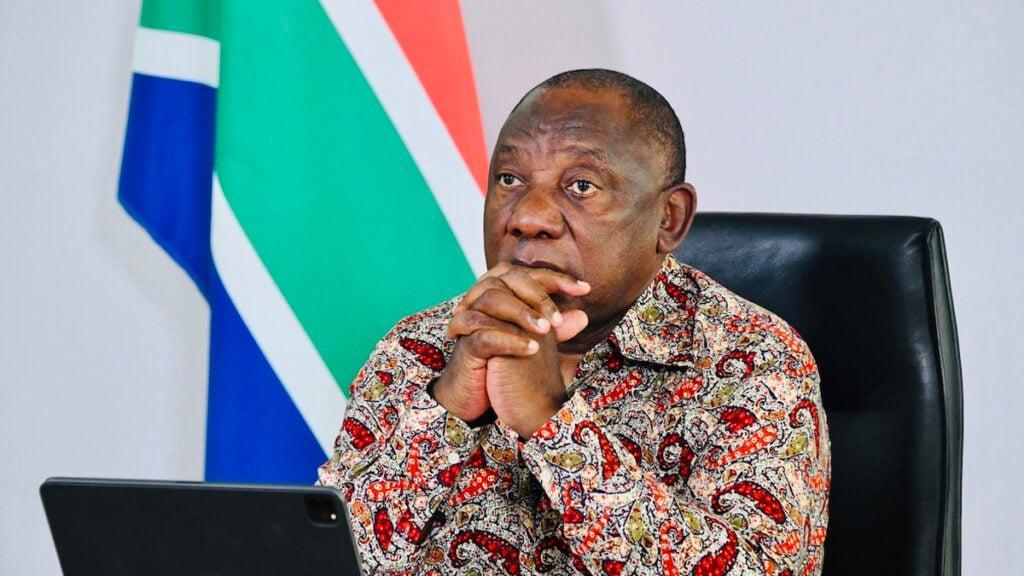Africa-Press – South-Africa. South African President Cyril Ramaphosa has encountered a fresh setback as he seeks to clamp down on rampant crime.
Nhlanhla Mkhwanazi, the head of the police in the eastern KwaZulu-Natal province, last week accused Police Minister Senzo Mchunu and some of his fellow officers of trying to quash a probe into political killings.
Mkhwanazi aired his allegations — which were denied by Mchunu — at a press conference surrounded by masked, rifle-bearing officers while the president was attending a summit in Brazil.
After returning home, Ramaphosa put Mchunu on leave and ordered a judicial probe, which could take months to complete. Meanwhile, the police officers implicated in wrongdoing are likely to remain in their positions.
“The president was responding to General Mkhwanazi’s allegations, which are very serious and potentially have grave implications for national security,” Vincent Magwenya, Ramaphosa’s spokesperson, said by phone.
The unproven revelation that the minister tasked with overseeing the police may himself be party to a crime and the decision to sideline him is likely to further dent already low morale within the security forces and detract from their efforts to tackle criminality.
Latest police statistics show on average more than 60 people are murdered daily in South Africa, among the most per capita in the world, and an international watchdog placed the country on a so-called gray list in 2023 due to its shortcomings in combating illicit financial flows and terror financing.
The furore and the drawn-out timeframe for investigating it may also further erode public confidence in the police, which a Human Sciences Research Council survey found already stands at an all-time low of 22%.
For Ramaphosa, who came into office on an anti-corruption ticket in 2018 following Jacob Zuma’s almost nine-year tenure that was marred by the looting of state funds, the scandal is a major political blow.
Mchunu is a close ally and remains popular in KwaZulu-Natal, a battleground province where he previously served as premier.
Some observers signalled that Mchunu had already made some progress since being appointed to his post a year ago.
Gareth Newham, an analyst at the Institute for Security Studies, told Johannesburg’s Sunday Times newspaper that the minister had been a breath of fresh air in his portfolio and had been driving some of the most positive initiatives to improve policing seen in a long time.
The president has faced calls to dismiss Mchunu outright, including from within the 10-member coalition government that was established a year ago after his party, the African National Congress, lost its majority in national elections.
Sanusha Naidu, a senior research associate at the Institute of Global Dialogue in Cape Town, said Ramaphosa is bound to follow procedure, ensure the allegations against Mchunu are properly scrutinised and safeguard the national interest.
“He can’t immediately go out and make a decision to fire the minister because what is the evidence around which he is making that decision?” she said.
Mchunu isn’t the only member of Ramaphosa’s executive who has come under fire — Nobuhle Nkabane, the higher education minister, stands accused of misleading parliament over controversial appointments she’s made. She has also denied wrongdoing.
The Democratic Alliance, the second-largest party in the governing coalition, has laid criminal charges against both ministers and accused Ramaphosa of double standards because he failed to dismiss them, yet fired a DA deputy trade minister for travelling abroad without permission.
The president will address the allegations against Nkabane soon, Magwenya said, without specifying whether changes to the executive are likely.
The ructions within the cabinet are emblematic of a broader failure by the coalition government to lay out a proper roadmap to tackle crime, yet the president’s reaction to the latest scandals was predictably cautious, said Ziyanda Stuurman, a Cape Town-based analyst and author of a book on policing in South Africa.
“It would be out of nature for Ramaphosa to have acted differently or more decisively or more swiftly than he did,” she said. “He is somebody who likes
For More News And Analysis About South-Africa Follow Africa-Press






